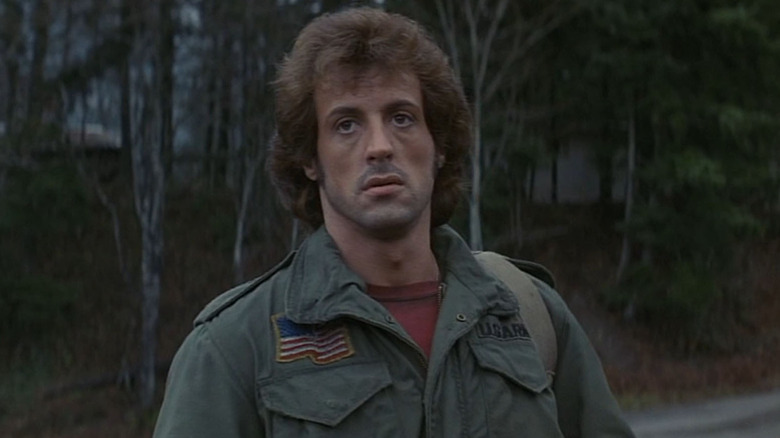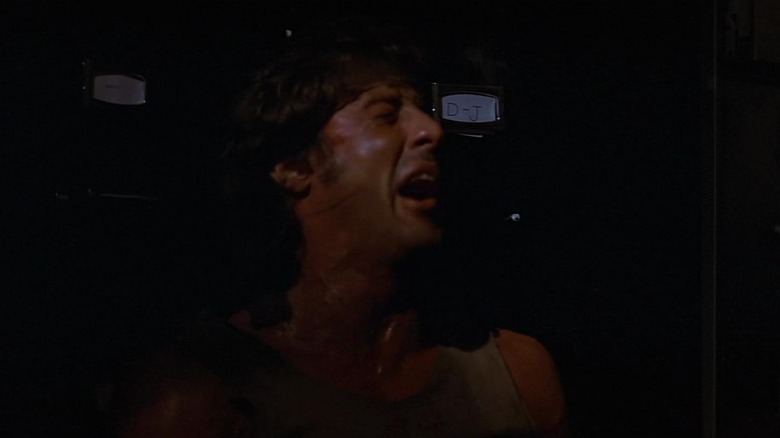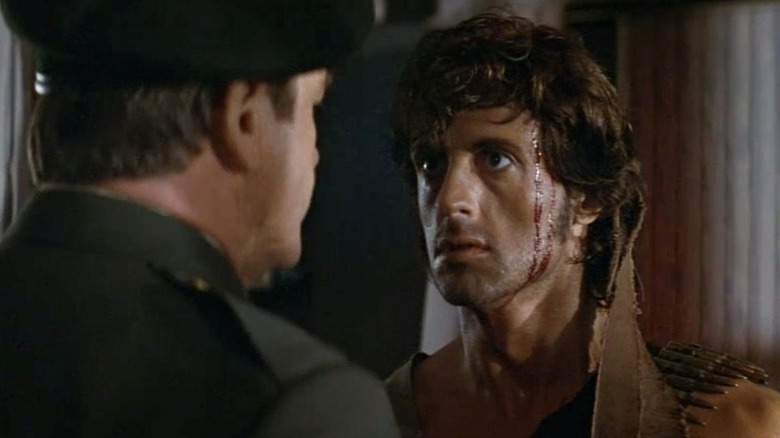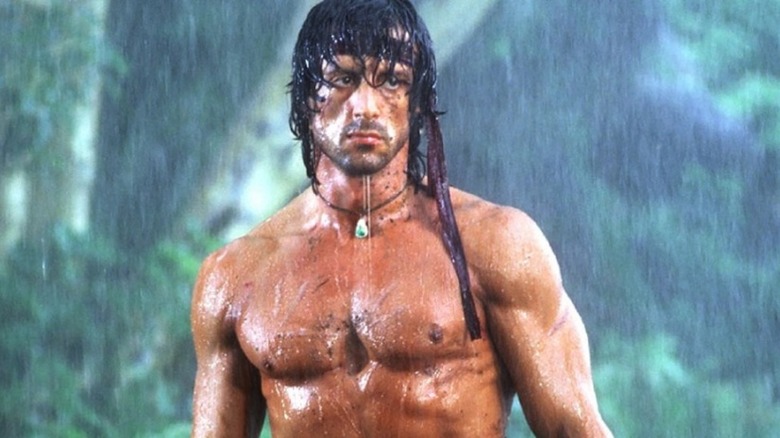How Sylvester Stallone Saved Rambo (And The Franchise) From An Early Grave
When you think of the quintessential embodiment of the '80s action hero, more often than not it tends to be a muscle-bound merchant of death who mows down a swath of nameless bodies with an entire arsenal at their disposal. If you've never seen a "Rambo" movie, it would be easy to think of its machismo lead as such through cultural osmosis alone. Sylvester Stallone's John Rambo is typically associated with glistening muscles and machine guns, due in part to the reputation of its four sequels, which makes it all the more fascinating when you see where "Rambo" initially started.
"First Blood," based on David Morrell's 1972 novel of the same name, sees Vietnam veteran Rambo enter the small mountain town of Hope, Washington, as a drifter looking to find accommodation after learning about the death of his military buddy. But rather than being greeted with hospitality, he's immediately harassed and arrested by the town's intolerant sheriff (Brian Dennehy). With the town's police department triggering his PTSD, Rambo escapes from the station and hides out in the woods, which prompts a full-scale manhunt.
It's in the final moments of "First Blood," where Stallone, the action star, has the film's antagonist in his sights for annihilation. The big bad getting his is an '80s action movie tradition, of course, but what happens next not only cements "First Blood" as one of the greats within its genre, but results in one of the finest moments of Stallone's career.
Rambo nearly met a much bleaker fate
Right as Rambo is about to make his first intentional kill through the film, in walks Col. Trautman (Richard Crenna), the Green Beret commander who trained him, imploring his protege to let the one-man war come to a close. What follows is a brilliant subversion as he lists all the ways in which the U.S. failed him after coming home. Rambo then rejects his automatic weapon and falls to the ground crying, as he tearfully recounts how he lost a friend during the war. Seeing the extent of which this whole thing got out of hand, Rambo gives himself up amid the destruction of an easily preventable war.
It's a testament to Stallone's performance that Rambo meets his end not in a storm of gunfire, but of empathy, as Trautman realizes his complicity in all this too. "First Blood" concludes on such a solemn but poignant note about the lasting effects of war on the soldiers who fight in it. Had "First Blood" gone with its original ending, however, Rambo's place in pop culture would have looked a lot different. While speaking with Filmmaker Magazine, director Ted Kotcheff describes the film's original conclusion, which would have made for a much darker ending:
"Rambo says to his colonel 'You made me. Now you should kill me.' The colonel has his gun out and thinks about putting Rambo out of his misery, but he can't do it. Rambo reaches up and blows himself away."
Test screenings were nothing short of disastrous
The original ending is a gut punch that kind of deflates everything that had been leading up to the pivotal moment, a sentiment Stallone shared with Ted Kotcheff (via Filmmaker Magazine):
"He took me aside and said, 'Ted, we've put Rambo through so much ... the audience has suffered with him through all of this, and now we're going to kill him? They are going to hate this, I'm telling you.'"
Taking Stallone's words to heart, Kotcheff, while at the mercy of a shoot that had gone overboard with its budget and shooting schedule, shot the theatrical ending, at the consternation of the film's producers. When it came time for test screenings, "First Blood" was first seen with Rambo's death included. As Kotcheff described to Filmmaker Magazine, the reactions were far from great:
"You could have heard a pin drop. A voice in the silence says 'If the director of this film is here, we should string him up from the nearest lamp post for doing this to Rambo.'"
While test screenings aren't a litmus test of what betters the film at hand, and this comment is a bit overboard, going with Kotcheff and Stallone's alternate ending was ultimately the right move. The biggest reason wasn't the notion of losing sequel potential, but being true to the film's message. It would have been really deflating if the film's solution to mental illness had been for Rambo to kill himself. Given how many veterans had related to his tearful breakdown, it would have been like further pouring salt on the wound.
Should Rambo have been saved from franchise potential?
Ted Kotcheff's action-thriller remains an effective, subversive take on the action hero, as Rambo's deadly skills are shown as a burdensome curse rather than assets. His instincts are not to kill, but merely survive the sadistic wrath of the country that trained him, and that now wants to execute him. Rambo is not a killer, at least, not intentionally. In many ways, "First Blood" is an anti-action movie, as Rambo's destruction in the finale is not cheer-worthy, but a haunting reflection of the man he was molded to be.
While the sequels have their moments, I can't help but wonder how the legacy of "Rambo" would have looked if they stuck to the ending we all know and let the film remain a singular anomaly in the action movie sphere. But when you think of Rambo in the present, it's difficult to separate the mentally ill soldier from the action hero who turns a horde of Burmese soldiers into meat confetti.
"Last Blood" was hyped up as Rambo's final outing, but given that he's still breathing after the credits, and Stallone's reluctance to keep making "Rocky" stuff after claiming he was finished with the character, I think it's safe to say the door will always be open for more.
"First Blood" is currently streaming on HBO Max.



